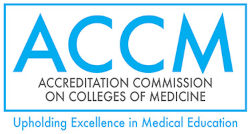Types of Accreditation
Three or Six Year Accreditation
A school that is found to be in full compliance with the Standards following a Full Accreditation Review (FAR) during the final year of the previous period of accreditation will be granted accreditation for a period of either three or six years. In some instances, areas for improvement may be identified with a recommendation that they be implemented by the time of the next mid-cycle inspection. The school is required to notify the Commission promptly of any substantive change, to remain in full compliance with the ACCM Standards of Accreditation and to complete the annual database and other required documentation. The purpose of these requirements is to enable the Commission to determine if the school remains in full compliance with the Standards and should retain its accreditation status.
A school seeking re-accreditation that is not in full compliance with the ACCM Standards of Accreditation will be granted accreditation for a period of three years. The Commission will attach conditions such as the need for updates in relation to areas of weakness or deficiency. The School will undergo a FAR in the final year of the three-year period of accreditation. At this time the Board may choose to grant a period of accreditation for three or six years, continue accreditation but place the school on probation, or withdraw accreditation.
Probationary Accreditation
In circumstances where a school has already been granted accreditation (three or six years), the Commission may place it on probation if it falls out of substantial compliance with the Standards. The Commission will conduct detailed annual documentary reviews of a school that has been placed on probation to monitor its progress. In some circumstances, additional site inspections (medical school campus, clinical sites) may be necessary.
A school may spend a maximum of two years in probationary status. At the end of the two-year period, based on the annual reviews and site inspections as appropriate, ACCM will accredit the school to for three years, withdraw accreditation entirely, or extend the probationary period for achieving compliance for good cause shown.
Probationary period extensions for good cause shown are made at the sole discretion of the ACCM according to the following criteria:
- The programme has demonstrated significant progress and has a realistic timeline for the resolution of any remaining noncompliance issues.
- The programme has provided written and compelling evidence describing its plans to come into compliance within the extension period (e.g., a programme has documented the commitment of financial and human resources to resolve all remaining noncompliance issues within the extension period).
- The programme has provided written and compelling evidence that the nature of the needed change (e.g., facilities construction or renovation, fundraising for scholarships) reasonably requires a time period exceeding two years and has provided a realistic timeline to address the deficiency.
- The programme has provided documentation of the need for actions by groups external to the medical education programme (such as decisions by university or legislative bodies) and provided a timeline for when these actions are likely to occur.
Schools applying for accreditation for the first time
A medical school expressing an interest in ACCM accreditation will often commence its communications with a general enquiry and a request for further information about the accreditation process. Once a school makes a formal application for first-time accreditation the following steps are followed:
Stage 1 – Preliminary assessment: An initial assessment by ACCM to determine whether the school meets ACCM’s basic requirements for consideration for eligibility
Stage 2 – Initial Review: An initial review of the School’s documentation by ACCM, on receipt of the initial application fee, in order to determine whether the school meets ACCM requirements to be considered as a candidate for accreditation.
Stage 3 – In-Depth Assessment: Subsequent to a decision that the school meets the initial requirements, and on receipt of the 2nd application fee, an in depth assessment of additional documentation by a team of Commissioners, leading to a report to the ACCM Board, which then decides whether the candidate school merits an inspection.
Stage 4 – Full Accreditation Review (FAR), to include on-site inspections of the medical school campus, the administrative headquarters and affiliated clinical sites.
An ACCM board decision regarding accreditation status, which is then communicated to the school and all relevant stakeholders. A school that is being evaluated for accreditation for the first time whose facilities are not in close proximity but are located in separate geographical locations may require several separate site visits by the ACCM inspection team over a specified time period in order to fully complete the requirements for accreditation. In these circumstances, the school may be granted accreditation for one year where it is found to be in substantial compliance with ACCM standards following an inspection of the pre-clinical campus.At the end of this year, when the administrative headquarters and clinical sites have been inspected, one year accreditation will, depending on the degree of compliance with the ACCM Standards of Accreditation, be replaced by:
- Three or six year accreditation
- Probationary accreditation
A school that is found to be in full compliance with the ACCM Standards will be granted accreditation for a maximum of 6 years. A school that is found to be in substantial compliance with the ACCM Standards will have its accreditation extended for three years. A school that falls out of substantial compliance with the Standards will be placed on probation.
However, a new applicant school where all facilities are co-located, thus permitting a full accreditation inspection to be carried out by ACCM in a single visit, may be granted accreditation for a maximum of 6 years if it is found to be fully compliant with the Standards at that time.
